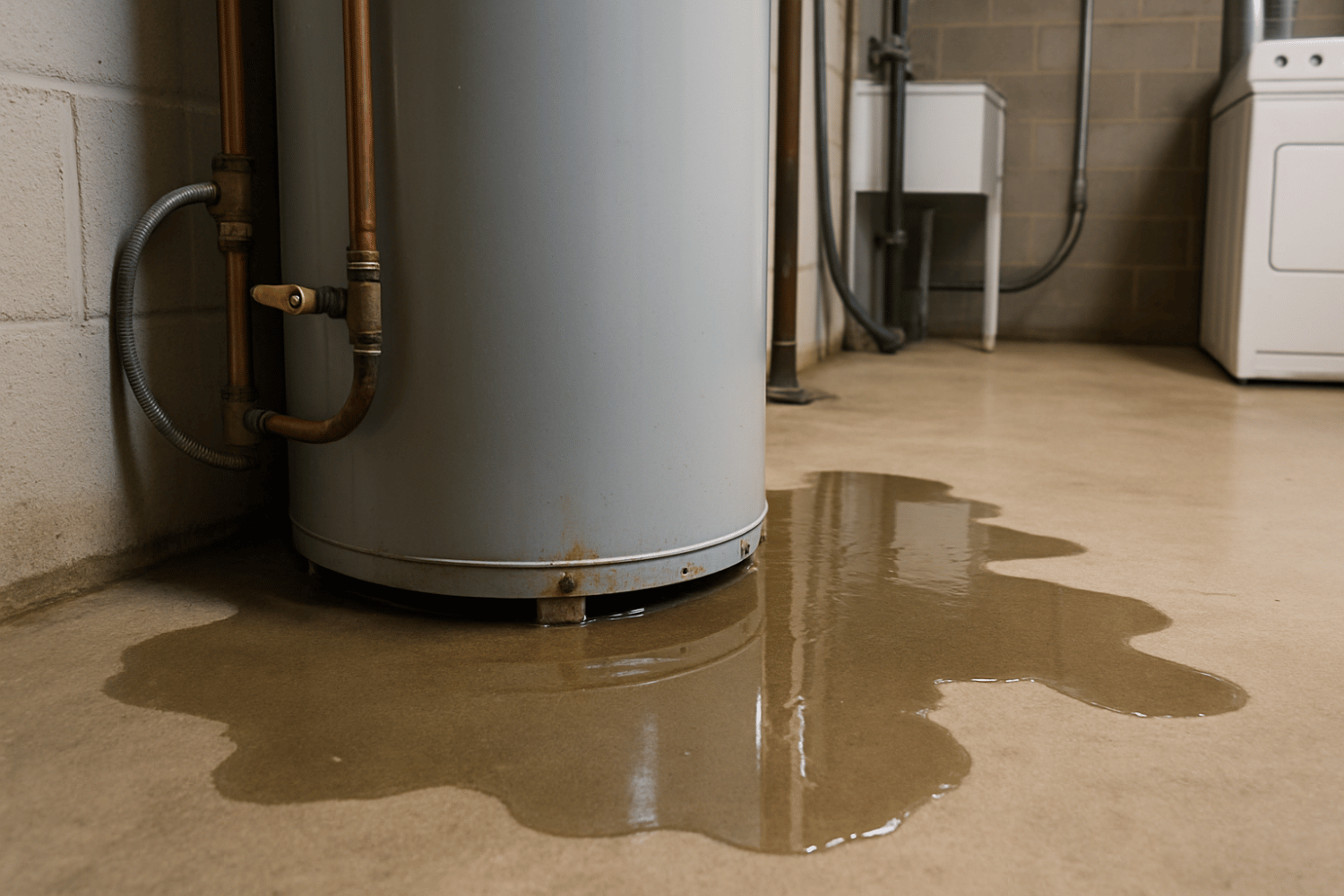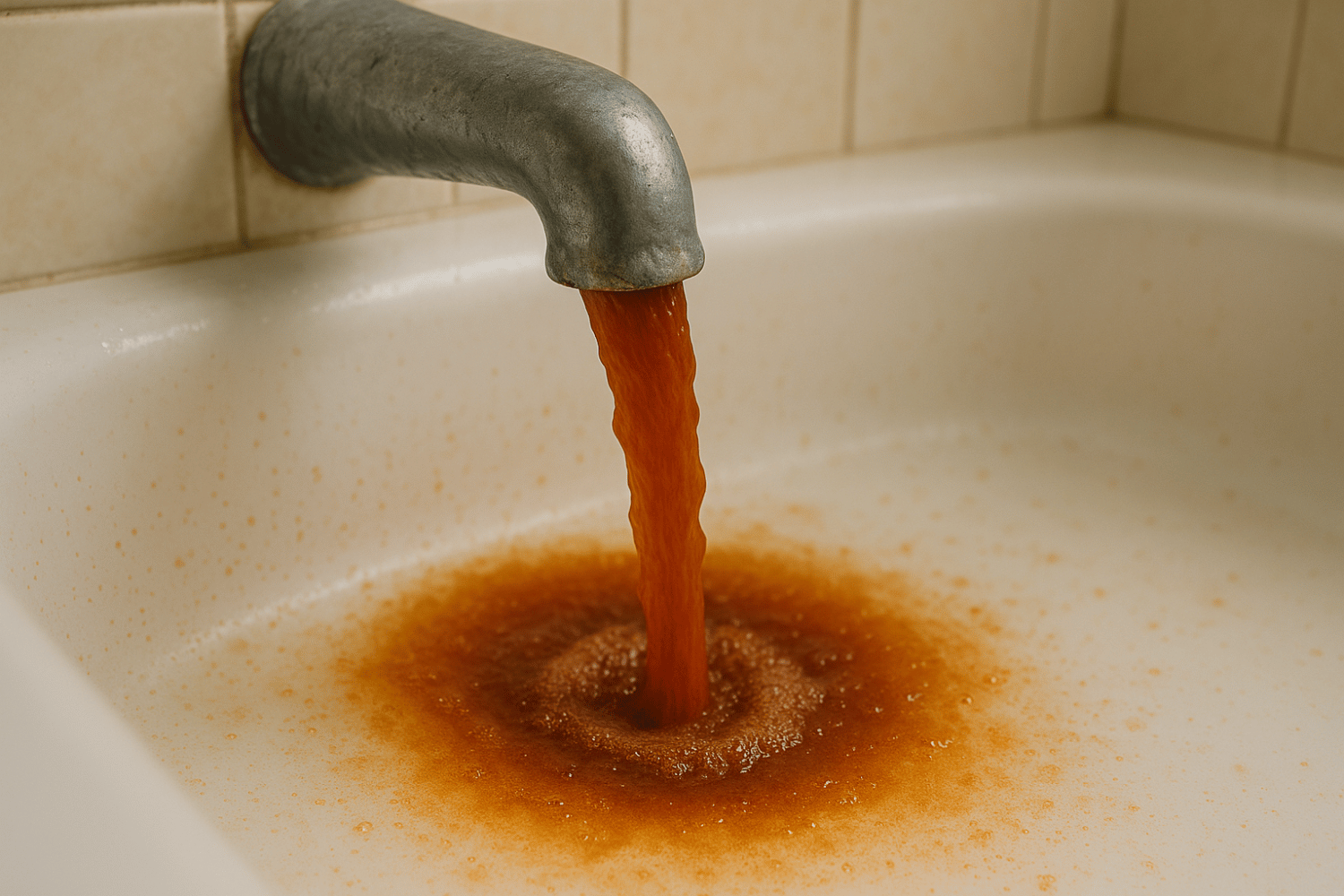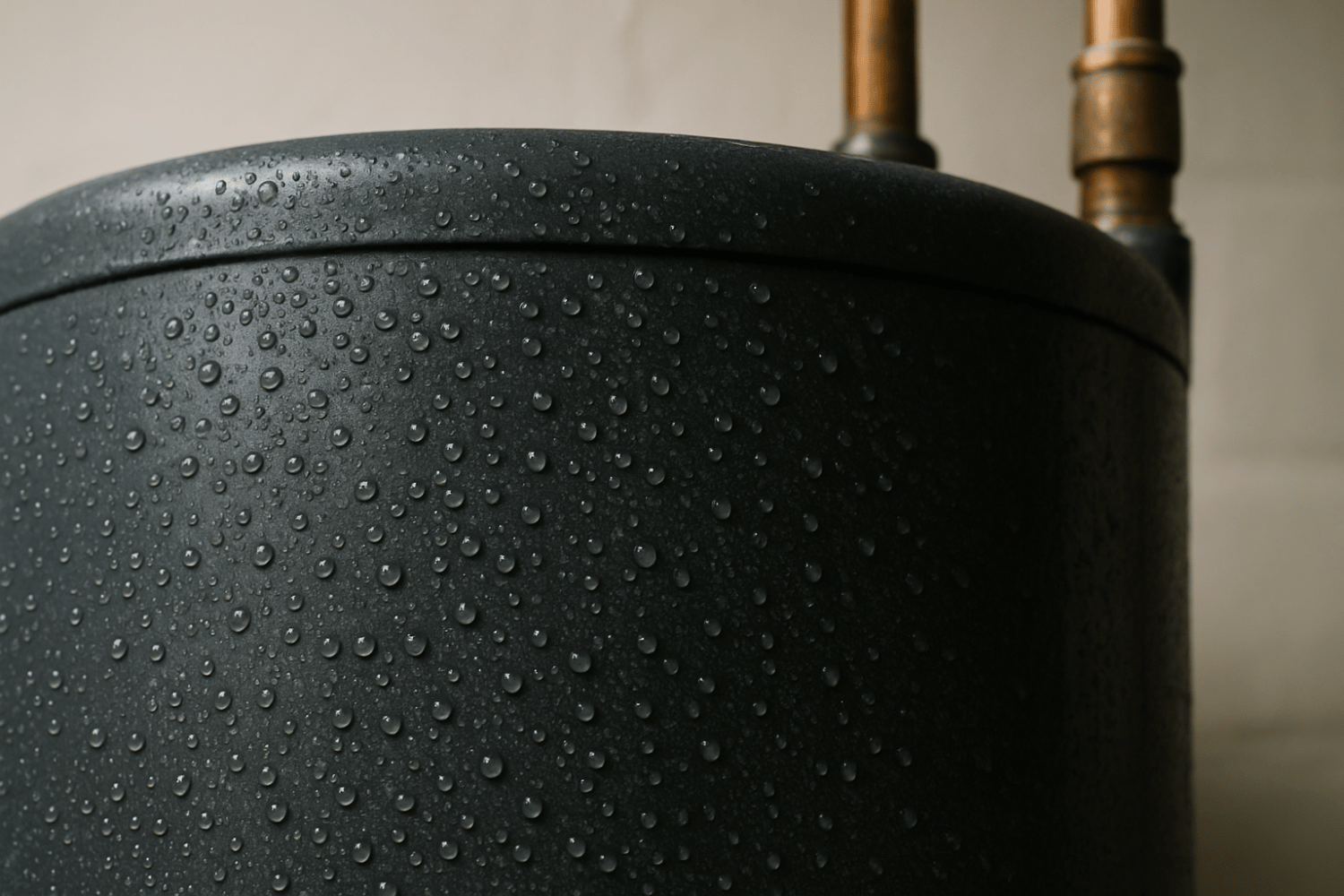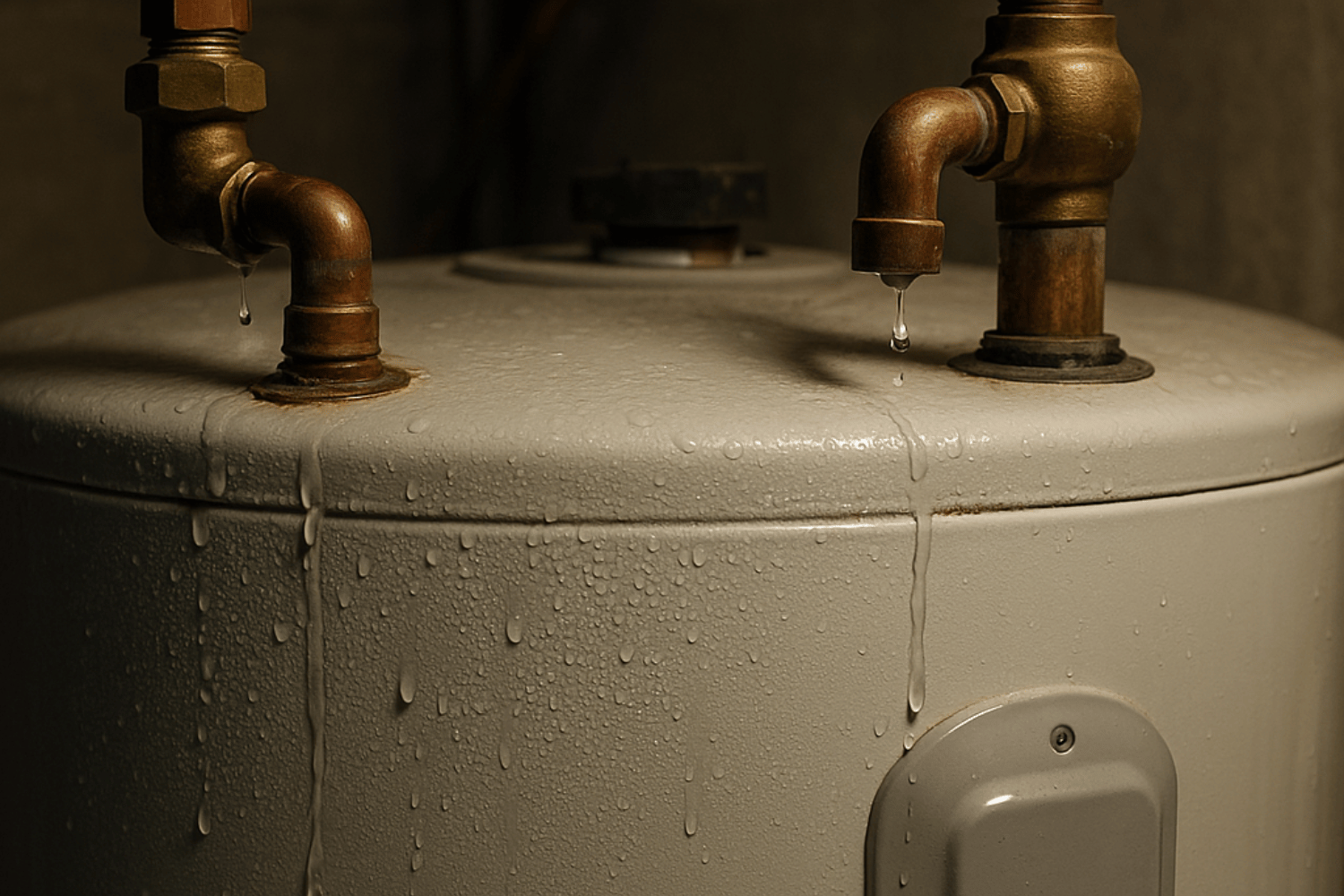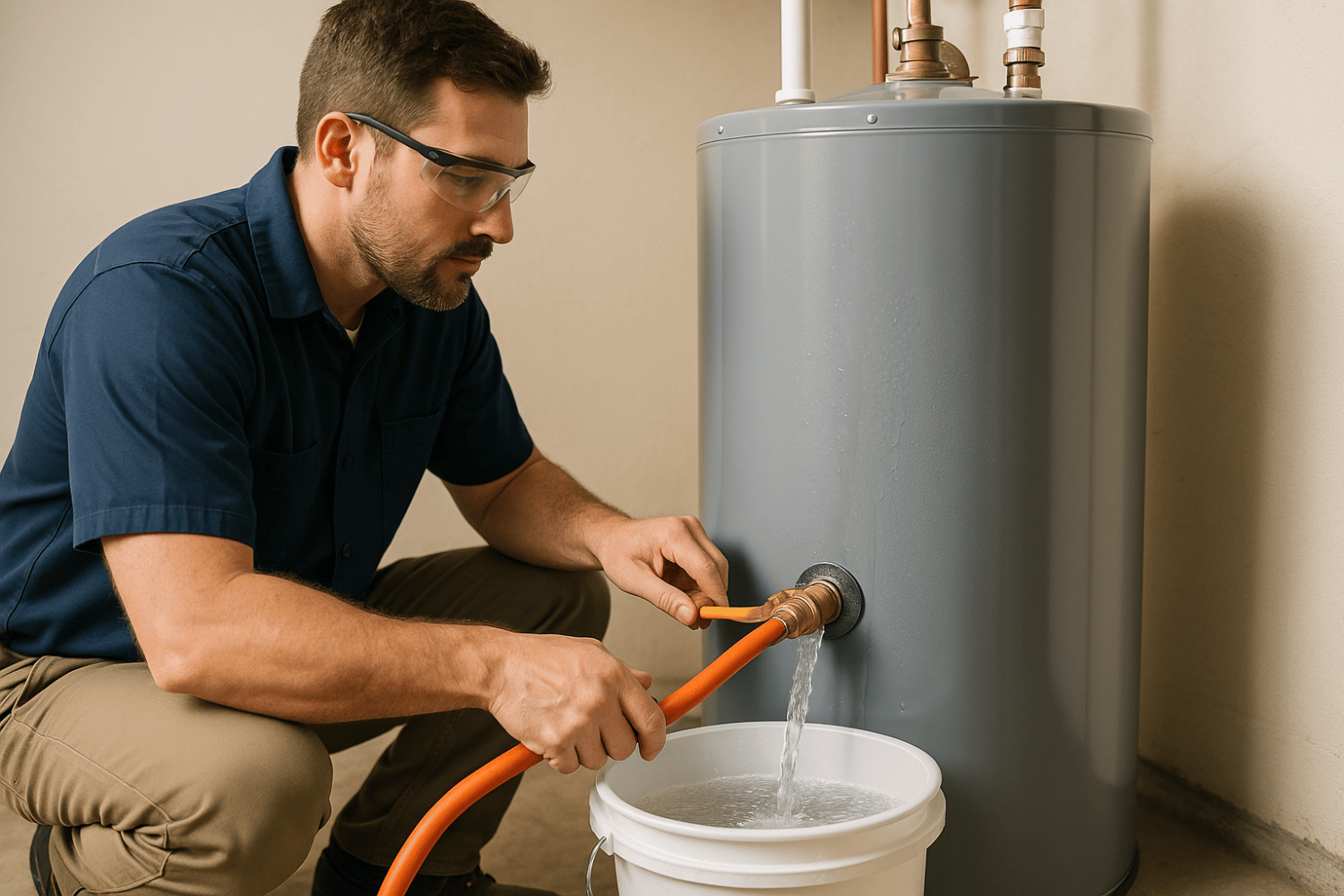Top 7 Signs Your Water Heater May Be Leaking and How to Spot Them
Is your water heater leaking? Catching the signs early can save you from expensive repairs. This guide breaks down the essential signs your water heater may be leaking and what to do next.
Key Takeaways
- Puddles and moisture around your water heater are clear signs of a potential leak that needs immediate attention.
- Listening for unusual sounds, like dripping or rumbling, can help you catch water heater issues early, preventing costly repairs.
- Regular maintenance, including flushing the tank and replacing the anode rod, can significantly extend the lifespan of your water heater and prevent leaks.
Puddles Around Your Water Heater
One of the most obvious signs of a water heater leak is the presence of puddles or standing water around the unit. Pooling water near your water heater is a clear indication of a possible leak that should not be ignored. Regular checks for moisture or puddles around valves and pipes connected to the heater can help identify leaks early.
If you notice water pooling, it’s essential to dry the area and examine the heater for persistent leaks. Turn off the cold water supply at the heater to prevent further water damage from a leaking hot water heater. Ignoring a leaking water heater can cause serious water damage, potential flooding, and mold growth.
To address water pooling issues:
- Check the water supply lines for leaks, as these are common sources.
- Regularly inspect these connections to catch issues early on.
- If water continues to pool after drying the area, call a professional plumber to assess the situation and perform necessary repairs. Additionally, consider hiring plumbing services for comprehensive solutions.
Dripping Sounds
Unusual dripping sounds from your water heater can signify a potential leak that requires immediate attention. Homeowners should listen carefully for any unusual noises coming from their water heater, as these can be early indicators of developing leaks. Sounds such as popping, banging, or hissing can indicate sediment buildup or potential leaks.
To prevent further damage from unusual dripping sounds:
- Trace any unusual dripping sounds.
- Perform a visual inspection of your water heater and surrounding areas to spot any signs of water leakage if you hear these noises.
- Take early action on these noises to save yourself from costly repairs later.
Rusty Water
Discolored water that appears rusty or metallic often signals internal corrosion within the water heater tank. Rusty water from the hot tap typically indicates internal corrosion within the water heater tank. The presence of rust on the exterior of the water heater often signifies that the inner tank is also deteriorating.
Flushing the tank regularly removes sediment and rust particles that discolor water. Bacterial growth in the tank can also cause discoloration, which may be treated by shocking the system with chlorine and flushing. Water heaters typically develop leaks due to aging tanks that are prone to rust and corrosion.
Act quickly if you notice rusty water. Corrosion can lead to leaks and considerable damage from corrosive materials. Regular maintenance and flushing of the water tank can help mitigate these issues and prolong the life of your water heater.
Moisture on the Tank Surface
Sometimes, the moisture you see on your water heater surface is not from a leak but from condensation. Condensation can cause water accumulation around the water heater, especially in humid conditions. In electric water heaters, the cold water inside the tank can cool the outer surface. This phenomenon can result in condensation occurring in a warm environment.
Gas water heaters may face condensation issues when cold water fills the tank. This can also occur when the burner ignites after not being used for a while. High-efficiency gas water heaters produce harmless condensate, which can also contribute to moisture.
To distinguish between condensation and a leak:
- Wipe the surface of the water heater.
- Check if moisture forms again later.
- Observe if the water pooling around the heater evaporates quickly; if it does, it’s likely due to condensation rather than a leak.
Checking for water returning after wiping is a good test for determining whether the moisture is from condensation.
Recognizing the difference prevents unnecessary panic and ensures prompt action on real leaks.
Decreased Hot Water Supply
A sudden drop in hot water availability often indicates that leaks are affecting the efficiency of the water heater. Inconsistencies in water temperature can signal leaks or malfunctions within the water heater. Watching hot water usage and duration can help spot potential leaks early.
Additionally, ensuring that your hot water heaters are properly maintained can prevent such issues.
If you notice that your hot water supply is dwindling faster than usual, it might be time to inspect your water heater for leaks. Prompt attention to these issues maintains your water heater’s efficiency and prevents inconvenient hot water shortages.
Increased Energy Bills
A malfunctioning electric water heater can lead to higher electric bills by causing the system to work harder to maintain the desired temperature. Even minor leaks in the water heater can lead to significant waste of water and increased energy costs because the heater compensates for lost water. Unexplained spikes in energy bills may indicate an underlying leak in your water heater.
To manage your energy usage effectively:
- Track your monthly energy usage to spot unexplained increases.
- Monitor your energy bills regularly to catch leaks early and save money.
- Check your water heater for leaks or malfunctions if you notice a sudden rise in your energy bills.
Strange Noises
Unusual sounds like rumbling, popping, or loud cracking from the water heater can indicate a problem. Common noises include popping and rumbling due to sediment accumulation, sizzling or hissing noise from heating elements, and high-pitched sounds due to restricted water flow.
Popping or rumbling sounds are typically caused by sediment buildup in the tank, while banging noises indicate water hammer when flow is abruptly stopped. If you notice any of these noises, it is advisable to arrange a visit with a professional service provider for inspection.
Early attention to these noises can prevent damage and keep your water heater running efficiently.
Common Leak Sources in Water Heaters
Water heater leaks can originate from several common sources, including a leaky water heater and a water leak. Understanding these can help you identify and address water heater leaking and water leaks promptly.
Let’s delve into the most frequent culprits: loose connections, faulty fittings, faulty pressure relief valves, and loose drain valve issues.
Loose Connections
Loose connections in water heaters can occur due to improper installation or wear over time. Loose inlet and outlet connections can lead to leaks in water heaters.
If there are leaks from loose pipe connections at the top of the water heater, you should:
- Tighten them gently with a wrench.
- Use appropriate tools to tighten any loose connections.
- Perform regular checks to catch and fix these leaks early, preventing further damage.
Faulty Pressure Relief Valve
A malfunctioning temperature and pressure relief valve can cause excessive temperature internal pressure in the water heater, leading to leaks. Too much pressure from high temperature or high-pressure water pressure entering the tank can trigger leaks, indicating a problem with the T&P valve.
Ensure the temperature setting is below 120 degrees if the temperature pressure relief valve is leaking. Before addressing issues with the T&P valve, ensure the tank is depressurized to prevent accidents.
Replacing a damaged T&P valve is necessary to avoid leaks and ensure proper function.
Drain Valve Issues
A leak from the base of the water heater is often due to issues with the drain valve, which can be caused by a loose fit or improper sealing. Corrosion can also compromise the integrity of the drain valve, leading to leaks. If the drain valve is not closing properly, it should be replaced to prevent ongoing leaks.
Visible leaks or water pooling beneath the water heater can indicate a problem with the water leaking from the leaking drain valve that needs urgent attention. Frequent inspections help you detect and fix these issues promptly.
Preventive Measures to Avoid Water Heater Leaks
Preventing water heater leaks is possible with regular maintenance and preventative maintenance. Proactive measures can extend your water heater’s lifespan and help you avoid expensive water heater repair.
Let’s explore some key preventive measures: regular maintenance, flushing the tank, and anode rod replacement.
Regular Maintenance
Annual maintenance checks prevent deterioration and potential leaks in water heaters. Key maintenance tasks include flushing the tank to remove accumulated sediment, checking all connections for tightness, and inspecting the anode rod.
Homeowners should regularly inspect for signs of leakage or damage to avoid serious issues. Routine maintenance catches problems early and ensures efficient water heater operation.
Flushing the Tank
Flushing the tank regularly:
- Removes sediment buildup, preventing leaks.
- Prevents sediment build-up at the bottom of the tank, which can lead to water discoloration.
- Maintains water quality by requiring regular flushing, reducing mineral buildup.
You should flush your water heater annually to ensure efficient operation. Regular flushing helps to prevent leaks that can occur due to sediment accumulation. This simple maintenance step can extend the life of your water heater and keep it running smoothly.
Anode Rod Replacement
The anode rod protects the metal components of a water heater from corrosion. Without a functioning anode rod, corrosive components can corrode the tank, leading to leaks. It is recommended to replace the anode rod every 2-3 years to prevent corrosion.
Quickly addressing leaks caused by a worn out anode rod is essential to prevent tank corrosion. Inspecting and replacing the anode rod regularly helps maintain a leak-free water heater.
Summary
Understanding the signs of a leaking water heater can save you from significant damage and costly repairs. From puddles around the unit to unusual noises and increased energy bills, these signs are crucial for early detection. Regular maintenance and proactive measures can help prevent leaks and extend the life of your water heater.
Don’t wait for a major problem to take action. Regularly inspect your water heater, perform necessary maintenance, and contact a professional plumber if you suspect any issues. Staying vigilant can keep your water heater running smoothly and your home protected from water damage.
Frequently Asked Questions
What should I do if I see puddles around my water heater?
If you see puddles around your water heater, it’s important to dry the area and check for leaks right away. Turn off the cold water supply and call a professional plumber to sort it out.
Why is my water heater making dripping sounds?
Dripping sounds from your water heater usually mean there might be a leak. It’s a good idea to check for any visible water around the heater to catch issues early.
What causes rusty water from my hot tap?
Rusty water from your hot tap is usually due to internal corrosion in your water heater tank. Regularly flushing the tank can help clear out the sediment and rust that cause this discoloration.
How can I prevent water heater leaks?
To prevent water heater leaks, make sure to perform regular maintenance like tank flushing, inspecting connections, and checking the anode rod. Replacing the anode rod every 2-3 years is also key to avoiding corrosion and extending your water heater’s life.
What are common sources of water heater leaks?
Water heater leaks often come from loose connections, faulty pressure relief valves, or problems with the drain valve. Keeping an eye on these areas through regular inspections can help prevent leaks before they become a bigger issue.

